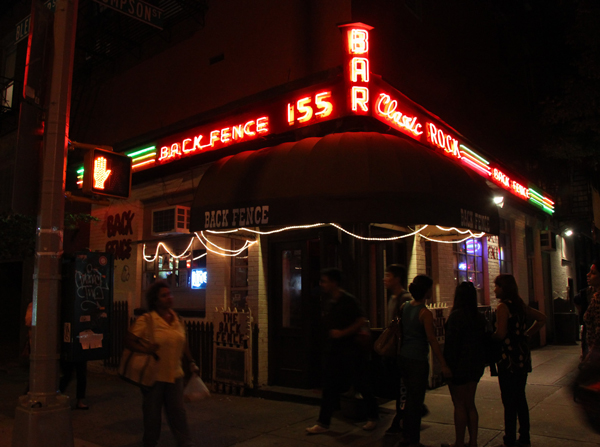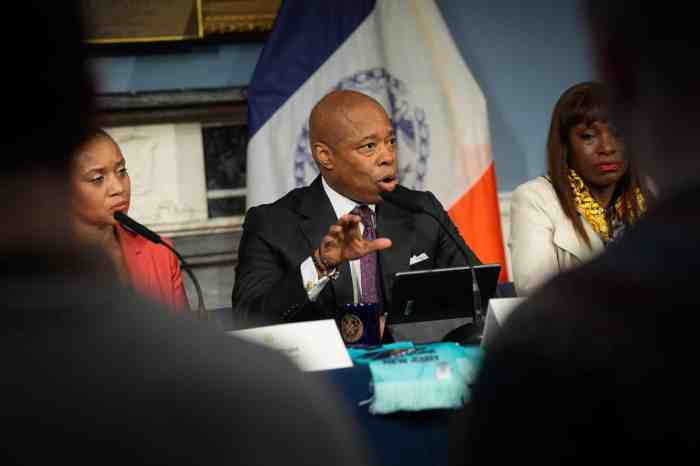BY SHARON WOOLUMS | The Back Fence on Bleecker St. — a Village landmark for 68 years — faced with a 75 percent rent increase, closed its doors last month for good. The owners, wishing to retire, should have been able to negotiate a fair lease so that they could have sold their business, allowing it to be kept open, and none of the employees would have lost their jobs.
Woulda, coulda, shoulda. We could have saved our small businesses if only one politician would have fought for a bill that long ago should have been enacted. Instead, nothing’s changed in City Hall, but our neighborhoods are changing faster than you can blink. All these years small businesses’ doors were slammed shut, they could have been saved if politicians had fought for a fair approach to curbing rampant unbridled greed.

Some say it’s too late, that there are already too-big-to-fail banks and franchise drug stores on every corner. But the ongoing threat to small businesses is a threat to the distinctive quality of every neighborhood, all in danger of losing their spirit and charm — of becoming carbon copies, destroying a way of life cherished and expected of a great city.
There’s only one real solution that will stop the threat. Only one bill will give rights to protect mom-and-pop shops from greedy, unscrupulous landlords’ take-it-or-leave-it lease renewals.
That solution is the Small Business Jobs Survival Act. First introduced in 1986 by former Councilmember Ruth Messinger, the act’s intent was to empower business owners to fairly negotiate with landlords for new lease terms during the commercial lease renewal process. No longer could landlords rent gouge or throw out businesses when the lease expired, nor could lease terms be solely dictated by the landlord. But with help from other elected officials, the powerful real estate industry succeeded in stopping the City Council vote for more than 25 years.
This bill’s a litmus test for candidates on jobs, small business and the economy. But Mom and Pop, hold off popping the champagne corks in celebration: This is New York where there are candidates who proclaim progressive values on Main St. but leave campaign pledges on the steps of City Hall. Once elected, they march into the halls of power, abdicating civic responsibilities to lobbyists and special interest groups.
In August 2009, Margaret Chin, then a candidate for City Council, proclaimed on the City Hall steps, “This is the time we got to get this bill passed. We are asking for an emergency vote. I agree with all the councilmembers here: No excuses. Our small businesses are the heart and soul of our community. Every community needs the jobs created by our small businesses.”
Elected to the City Council and placed on its Small Business Committee, Chin later was asked by advocates to become the prime sponsor of the bill.
In October 2009, with every member of the Small Business Committee and 32 councilmembers as sponsors of the bill, the S.B.J.S.A. would have passed. Council Speaker Christine Quinn, however, didn’t allow the vote, claiming the bill had “legal concerns and would not stand up to a court challenge.”
Steven Barrison, spokesperson for the New York City Small Business Congress, outraged by this roadblock, called it “a travesty of democracy, because at the bill’s public hearing no one from the real estate industry had testified of any legal concerns whatsoever.”
In April 2010, the S.B.J.S.A. was reintroduced. The Council speaker’s legal department never recommended changes to address legal concerns, leaving in place the only excuse blocking the vote for more than three years.
In November 2010, an impartial legal review panel, at a forum at Bronx Borough Hall on the bill’s legality, confirmed what advocates already knew: The S.B.J.S.A., as currently written, is fully constitutional and legally sound to withstand likely court challenges. No section of the S.B.J.S.A. was deemed “vulnerable” to being found unconstitutional in a court challenge.
In June 2013, at a Queens conference on the future of the S.B.J.S.B., Councilmember Chin, the bill’s prime sponsor, stated, “Our city’s small businesses face a crisis and needed the bill to pass to save them from high rent increases.” Advocates fearing small shop extinction in the near future, called for an immediate hearing on the bill — but Chin didn’t do it.
In August 2013, at a public event in the Village, I asked Chin about the bill’s progress. She said she was working to gain enough sponsors to override a mayoral veto. Later, when asked by The Villager’s editorial staff about the legislation’s status, Chin claimed it was stalled due to the “legality of the bill.”
Advocates made a simple, routine request that she ask the City Council’s legal department to put in writing specific changes to satisfy legal concerns. To advocates’ chagrin, Chin, as prime sponsor, has never called for a hearing on the bill nor challenged Speaker Quinn’s claim of legal issues.
During interviews with The Villager’s editorial staff prior to the mayoral primary, both Quinn and Bill de Blasio said they were advised the bill was not legally enforceable.
Councilmember Gale Brewer told The Villager she didn’t feel her colleague Robert Jackson marshaled sufficient support in the Council for the bill when he was leading the push for it.
Candidates, like Quinn and de Blasio, expected voters to believe the only problems facing small business are fines and loans.
“Nothing could be further from the truth,” said Sung Soo Kim, New York City’s leading small business advocate for more than 30 years. “Without the rights and protection of the S.B.J.S.A., mom-and-pop businesses will soon become extinct in New York City — the American Dream will be dead.”
To Chin’s excuse that the bill needed enough sponsors to override a mayoral veto, Kim responded, “The mayor is leaving office and all his threats to veto legislation are being ignored. The legislators are voting for bills he’s against and overwhelmingly overriding his vetoes. The small business community just wants a vote on our bill to give us rights, and councilmembers can now vote their conscience, without the influence of either the speaker or the mayor.”
Quinn, Chin and other councilmembers who were accused during the election of being in the pocket of real estate lobbyists, now have a chance to prove this perception wrong. The S.B.J.S.A. now has 24 sponsors, including the majority of the Council’s Small Business Committee. Call your councilmember now for a much-needed emergency vote. Write them. E-mail, tweet, Facebook your friends so this becomes known citywide, because your councilmember’s vote is needed to pass this bill before it expires in December.
Councilmembers leaving office this year have the chance to make the saving of mom-and-pop stores their legacy.
Chin declined comment for this talking point.
For more information, visit www.savenycjobs.org

















